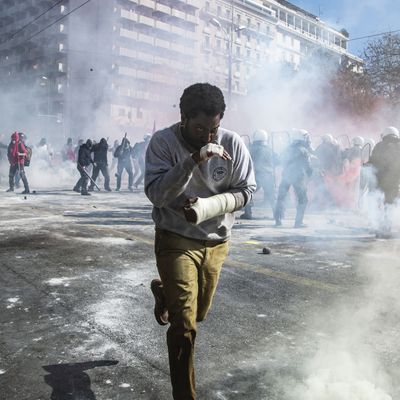
The opening scenes of Beckett are so unlike the rest of Beckett that, were it not on Netflix, you might wonder if you accidentally sat on the remote and changed the channel to an entirely different movie. The dissonance feels intentional, if awkward. As his film hops from genre to genre, director Ferdinando Cito Filomarino seems to be working toward a comment on the nature of grief, guilt, and persistence. Unfortunately, the results can’t quite match the scale of his ambitions.
The story begins with an American couple on vacation in Greece. Beckett (John David Washington) and April (Alicia Vikander) are very much in love and able to shut out the rest of the world — including the political turbulence glimpsed occasionally on TVs in the cafés they visit. Their moments together are filmed with refreshing intimacy, and Vikander and Washington seem genuinely at ease around each other. One night, however, as the couple drives along a country road to the next hotel on their itinerary, Beckett falls asleep at the wheel and they go flying off a cliff. The car smashes into a house and April is killed instantly. As he scrambles out of the vehicle, Beckett glimpses a young, red-haired boy watching them from inside the house. Later, when he mentions the child to the police, they insist that the house was abandoned. Then, our distraught hero returns to the scene of the accident — not to find the kid, it seems, but to take his own life because of the grief now consuming him. Suddenly, the cops show up and start firing. And we’re off.
As Beckett morphs from romantic tragedy to man-on-the-run adventure to political thriller, much of the pressure of holding the movie together falls on Washington, whose character’s compelling bereavement is quickly replaced by pure survival instinct. The actor is a simpatico figure, to be sure — a step or two behind the action, more Jimmy Stewart than Cary Grant. But he needs something to do besides just, you know, run; he’s not charismatic enough to rivet us with his very presence. And, alas, far too much of Beckett is devoted to our hero’s not-all-that-dramatic flight across the Greek countryside as he goes from house to house to bus to train.
By the time the second half rolls around and Beckett meets up with a pair of activists (Vicky Krieps and Maria Votti), the film begins to make the inevitable connection between his accident and the political turmoil around him. The movie seems to be going for a kind of Parallax View–style paranoia, as well as the high-pursuit drama of something like The Fugitive. But such classics captivate us with their ornate mysteries and procedural minutiae; no two scenes in those pictures tend to be alike. Beckett, by contrast, gives us so little information about what’s going on that all we’re left with is a guy running around and getting shot at, over and over again. It’s more Sisyphean than Hitchcockian.
And yet, director Filomarino is onto something here. The warm intimacy of the movie’s early scenes is replaced by such shocking brutality by the end that the violence feels like an emotional correlative, a blood ritual of sorts. Filomarino films both the opening and closing scenes with a real eye for the physicality of the moment, and in doing so he gives Beckett some necessary psychological shading. This man who wanted to kill himself has found cosmic purpose in the bodily mortification required to conclude his quest. Sadly, it’s too little, too late. That it all winds up clicking together by the end makes it doubly frustrating that the rest of Beckett drags so much.
More Movie Reviews
- Death of a Unicorn Is 5 Pounds of Purple Poop In a 10-Pound Bag
- The Thriller Drop Is a Perfect Addition to the Bad-First-Date Canon
- The Accountant 2 Can Not Be Taken Seriously


